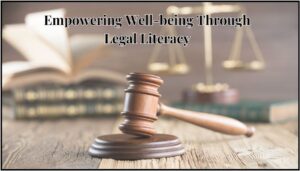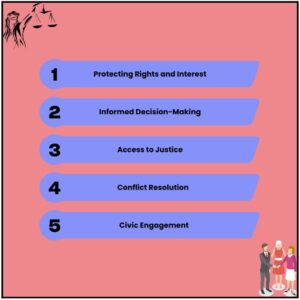
We need to know our way around the legal system to take care of ourselves. Understanding legal principles helps individuals comprehend the functioning of the system, assert their rights, and make impactful decisions that significantly influence their lives. If we can break down the legal process and get familiar with the resources available, we can handle our own legal stuff and fix problems before they get out of hand.
What is Legal Literacy?
Legal literacy entails possessing the skills and knowledge necessary to navigate legal matters in everyday life. It means understanding the basics of how the law works, spotting potential legal problems, and knowing where to find good advice when you need it. Fundamentally, legal literacy revolves around understanding the origins of laws, such as constitutions, statutes, and court rulings.
Legal literacy means spotting potential legal issues in daily life and understanding your rights and duties. You need to understand legal jargon, how the system works, and the players involved – like courts and agencies that help settle disputes. Slaughter & Lupton Personal Injury Lawyers can help you take action to protect yourself and find reliable legal information and help when needed.
Importance of Legal Literacy
Acquiring legal literacy can empower individuals in numerous ways:
Enhancing Well-being through Legal Literacy
Legal literacy plays a vital role in promoting personal well-being by empowering individuals to take control of their legal affairs and make informed decisions that align with their best interests.
Reducing Stress and Anxiety
Navigating legal issues can be a daunting and overwhelming experience, often leading to significant stress and anxiety. Legal literacy can alleviate these burdens by providing individuals with the knowledge and confidence to understand their rights, obligations, and available resources.
This understanding can help mitigate fears and uncertainties, promoting a greater sense of control and peace of mind. For instance, knowing when to consult a Virginia personal injury attorney can make a significant difference in handling personal injury cases effectively.
Facilitating Informed Decision-Making
Effective decision-making is crucial for personal well-being, and legal literacy plays a pivotal role in this process. By understanding the legal implications of various choices, individuals can make more informed decisions that align with their values, goals, and best interests.
This empowerment can lead to increased confidence, self-determination, and overall life satisfaction. For example, knowing the role of a car accident lawyer can help individuals seek appropriate legal assistance when needed.
Preventing Legal Disputes and Conflicts
Legal disputes and conflicts can have profound negative impacts on an individual’s mental and emotional well-being. Legal literacy can help individuals identify potential legal issues before they escalate, enabling them to take proactive measures to prevent disputes or resolve them through appropriate channels.
This proactive approach can minimize the stress and turmoil associated with legal battles, promoting overall well-being. Understanding the responsibilities of a pedestrian accident lawyer can be crucial in avoiding lengthy and stressful legal conflicts.
Promoting Financial Stability
Legal literacy can also contribute to financial well-being by equipping individuals with the knowledge to navigate legal matters related to employment, contracts, and consumer rights. Understanding their rights and obligations in these areas can help individuals avoid costly legal mistakes, protect their financial interests, and make informed decisions about their financial future. Knowing when to seek help from a catastrophic injury attorney can be pivotal in securing rightful compensation and protecting one’s financial stability.
Fostering Legal Literacy in Communities
Promoting legal literacy within communities is essential for empowering individuals and enhancing collective well-being. Here are some strategies that can be implemented:
Educational Initiatives
Governments, educational institutions, and community organizations can collaborate to develop and implement legal literacy programs. These initiatives can include workshops, seminars, and online resources that provide accessible and understandable information on various legal topics, such as understanding your rights after a car accident or the role of a car accident lawyer.
Community Legal Clinics
Establishing community legal clinics staffed by legal professionals and law students can provide affordable or pro bono legal advice and guidance to individuals in need. These clinics can serve as valuable resources for enhancing legal literacy and promoting access to justice.
For instance, a community legal clinic might offer advice on how to choose the best personal injury lawyer in Virginia Beach or explain the services of accident lawyers in Virginia Beach.
Partnerships with Legal Professionals
Building partnerships with legal professionals, such as attorneys, paralegals, and law firms, can facilitate the dissemination of legal knowledge and resources within communities. These professionals can offer their expertise through public forums, workshops, or online platforms, making legal information more accessible and understandable.
For example, a pedestrian accident lawyer might host a seminar on pedestrian rights and safety, or a catastrophic injury attorney could provide guidance on dealing with long-term injury claims.
Leveraging Technology and Digital Resources
In today’s digital age, leveraging technology and online resources can be an effective way to promote legal literacy. Online portals, mobile applications, and social media platforms can provide easily accessible legal information, tools, and resources tailored to specific communities and their needs.
For instance, an online platform could help individuals find a car accident attorney or truck injury lawyer, providing valuable information on how to proceed after an accident. By incorporating these strategies, communities can become more legally literate, enabling individuals to make informed decisions and access the justice they deserve.
| Strategy | Benefits |
| Educational Initiatives | Provide accessible and understandable information on various legal topics through workshops, seminars, and online resources. |
| Community Legal Clinics | Offer affordable or pro bono legal advice and guidance, promoting access to justice and enhancing legal literacy. |
| Partnerships with Legal Professionals | Leverage the expertise of attorneys, paralegals, and law firms to disseminate legal knowledge and resources within communities. |
| Leveraging Technology and Digital Resources | Utilize online portals, mobile applications, and social media platforms to make legal information more accessible and tailored to specific community needs. |
Conclusion
Empowering people through legal know-how is key to a happier, fairer world. When you understand the law, you can make smart choices, look out for yourself, and avoid legal problems. We can make this happen by educating people, working with communities, and teaming up with lawyers to simplify the legal system and make it accessible to everyone. So, take charge of your legal life and look forward to a brighter, more in-control future.
Frequently Asked Questions
How can legal literacy help me in my daily life?
Legal literacy enables individuals to identify instances where their rights might be infringed, comprehend the legal ramifications of different decisions (e.g., contracts, employment, personal relationships), and navigate legal procedures more efficiently, ultimately alleviating stress and anxiety.
Where can I acquire legal literacy skills?
Various avenues exist to enhance legal literacy, including educational initiatives, community legal clinics, partnerships with legal professionals, and online resources provided by government agencies, non-profit organizations, and educational institutions.
Is legal literacy only relevant for those facing legal issues?
No, legal literacy offers benefits to all individuals, regardless of their circumstances. Legal literacy encourages active citizenship, facilitates informed decision-making, and empowers individuals to advocate for policy changes that positively affect their communities.


